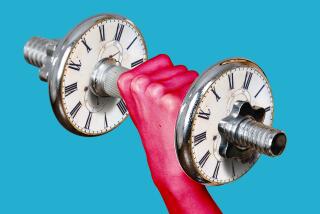Weights Carry Gains, Risks for Kids
- Share via
WASHINGTON — Weight training can make even children stronger, but the American Academy of Pediatrics worries about young would-be Olympians working out in their basements or in loosely supervised programs.
The organization’s revision of its 1982 policy statement reflects recent findings that weight work can strengthen children as young as 7 or 8, said Dr. Michael A. Nelson, chairman of the academy’s Committee on Sports Medicine and Fitness.
“It is reasonable to assume that strength training might be of benefit to elementary school-age children who might participate in formal sports programs,” said Nelson, who practices in Albuquerque, N.M.
However, Nelson advises young athletes not to try to train themselves.
“Strength training programs for pre-pubescent, pubescent and post-pubescent athletes should be permitted only if conducted by well-trained adults,” the policy statement said.
“So much of this depends on good coaching and supervision,” said Dr. William L. Risser, professor of pediatrics at the University of Texas Medical School in Houston, the statement’s principal author.
Adults should be able to prove their knowledge, with certification from a professional organization such as the National Strength and Conditioning Assn., Risser said.
“All we’re trying to say is learn how to do it, do it right and safely, and you may save yourself some major grief,” Risser said.
The academy prefers athletes who are not physically mature to concentrate on strength work.
A good strength training system would use weights that can be lifted 12 to 15 times per set, Nelson said. If the weights are too low, an athlete can raise them for the next set, he said.
Immature bodies may not be ready for competition, which generally involves lifting as much as you can in a few trials, the doctors say. “Since there are obviously some fairly serious risks, it seems reasonable to wait,” Risser said.
Among the risks is that repeated maximal lifts could damage the growth plates at the ends of an athlete’s bones, he said.
The physicians also advise young athletes, and their parents and trainers, to question why they want to build strength. The policy statement is wary of bodybuilding or competitive weightlifting.
“Because very little data are available on the relative rate of injury at different ages, controversy exists concerning when young athletes should be allowed to lift maximal amounts of weight,” the statement says. However, it says that the limited data available indicate that competition can lead to “significant injury risk.”
The statement recommends waiting to compete in weightlifting until the peak growth period is over--generally, about 15 for either sex.
However, it notes that weightlifting competition organizations have different rules.
The U.S. Weightlifting Federation lets kids join at 12, according to communications director Mary Ann Rinehart. Most start by working on technique, but the program has “quite a few” 14-year-olds qualified for competition, she said.
The American Athletic Union also has a program for 12-year-olds, its Junior Olympics, said Frank R. Gancarz of Glastonbury, Conn., past chairman of the Junior Olympics’ weightlifting committee.
“We have very few injuries in the sport, compared to other sports,” he said.
More to Read
Go beyond the scoreboard
Get the latest on L.A.'s teams in the daily Sports Report newsletter.
You may occasionally receive promotional content from the Los Angeles Times.






